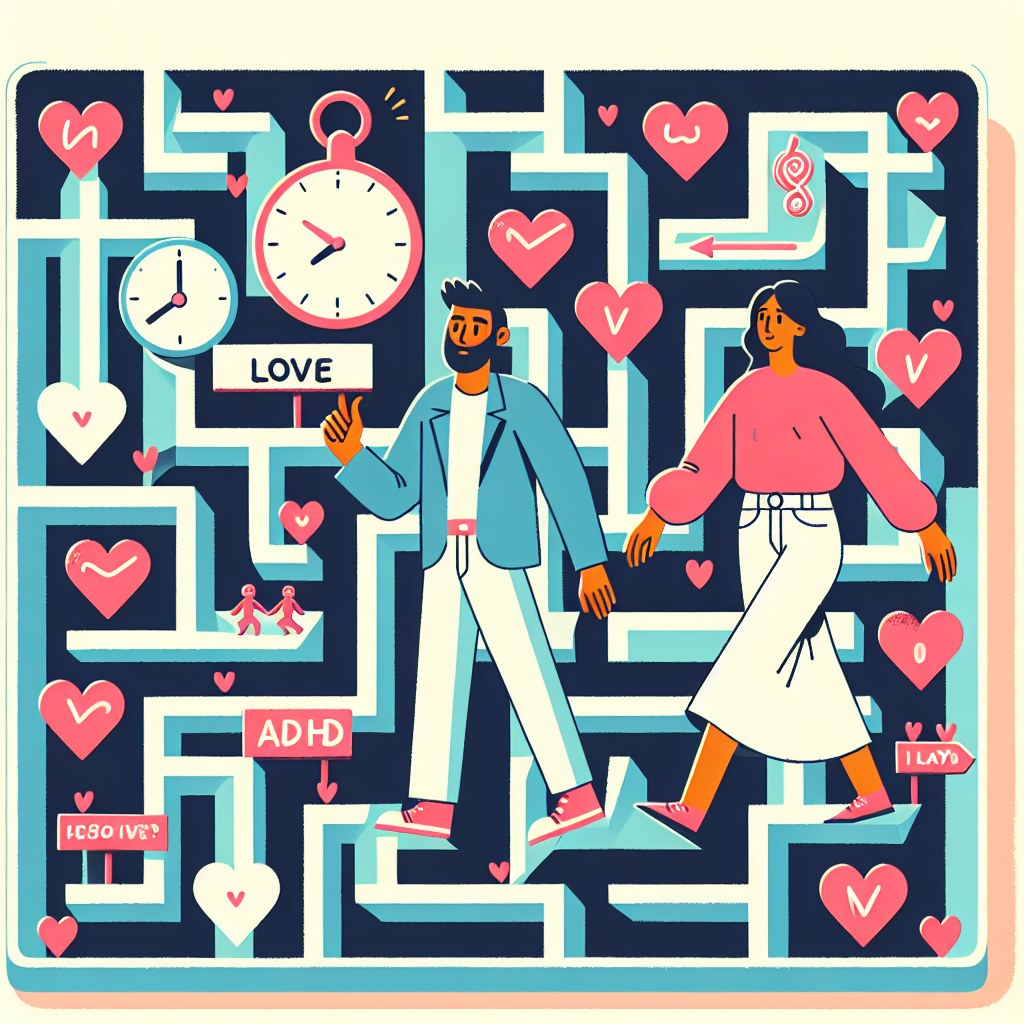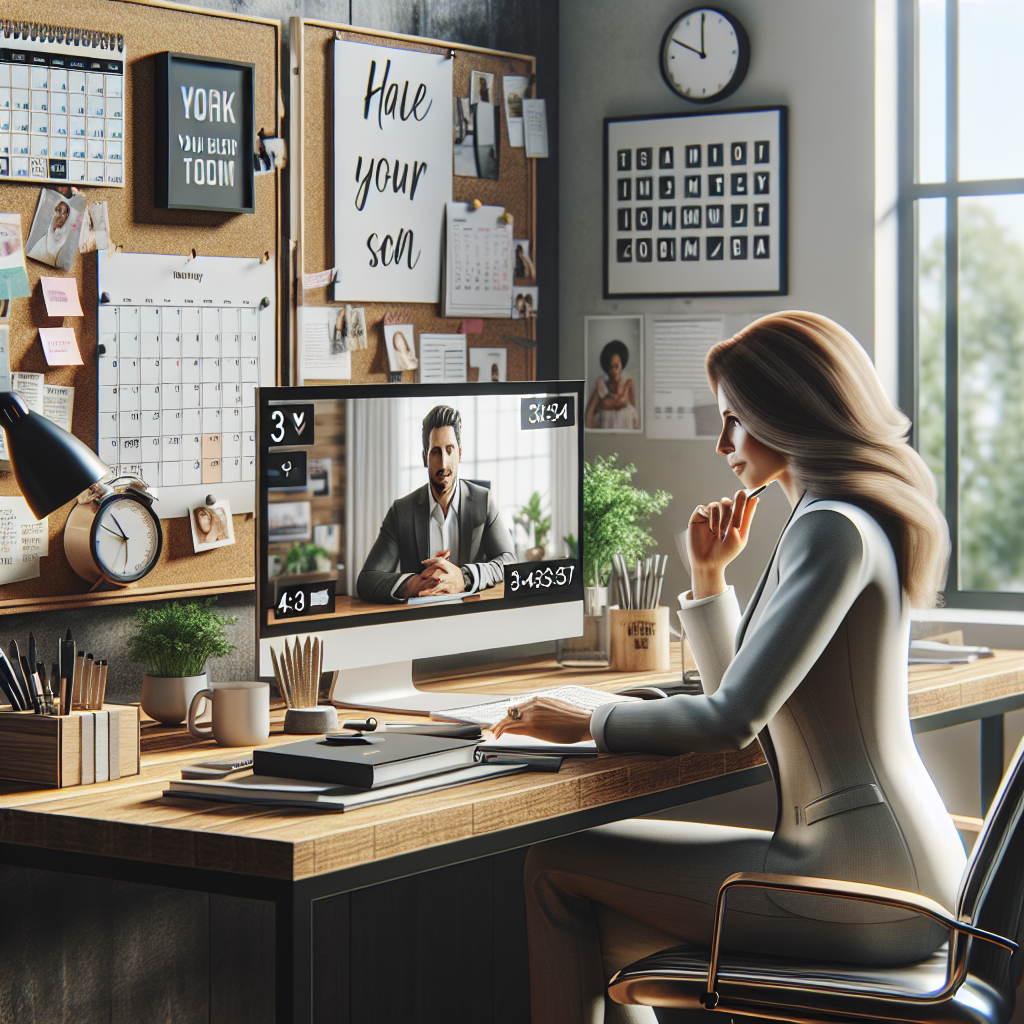
Navigating Love and Partnership with ADHD: A Survival Guide
Introduction
Welcome to the wild and wonderful world of ADHD and relationships! If you’ve ever felt like you’re navigating a roller coaster while blindfolded, you’re not alone. The journey of love with an ADHD partner can be as thrilling as it is challenging. From spontaneous adventures to unexpected detours, every day is a new experience.
Living with ADHD in a relationship often means grappling with unique ADHD relationship challenges. Whether it’s the struggle to maintain focus during deep conversations or the occasional emotional rollercoaster, understanding how ADHD impacts relationships is key to thriving together.
But fear not! This survival guide is here to help you navigate these choppy waters. We’ll explore practical strategies for managing ADHD in relationships, enhancing communication, and building intimacy without losing your sanity (or your sense of humor).
So grab your favorite beverage, settle in, and let’s dive into the nitty-gritty of love and ADHD. Whether you’re dating someone with ADHD or are already knee-deep in an ADHD marriage, there’s something here for everyone. Let’s transform those potential pitfalls into stepping stones toward a stronger partnership!

Understanding ADHD and Relationships
When it comes to ADHD and relationships, it’s essential to start with a clear definition. ADHD, or Attention-Deficit/Hyperactivity Disorder, can manifest in various ways, impacting how individuals connect with their partners. Think of it as a unique lens through which one views the world sometimes vibrant and colorful, sometimes a bit blurry.
Many people mistakenly believe that ADHD is just about being hyper or inattentive. In reality, it encompasses a range of symptoms that can affect emotional regulation, impulse control, and organizational skills. These factors can significantly influence the dynamics of adult relationships.
For instance, ADHD emotional regulation in relationships often leads to misunderstandings. A partner with ADHD might struggle to manage emotions effectively, resulting in heightened sensitivity or impulsive reactions. This can create challenges in communication and intimacy.
Common Misconceptions About ADHD and Love
Let’s bust some myths! One common misconception is that people with ADHD are simply lazy or unmotivated. This couldn’t be further from the truth! Many individuals with ADHD are incredibly passionate and creative but may struggle with focus and follow-through.
- Myth: People with ADHD don’t care about their relationships.
- Truth: They often care deeply but may have difficulty expressing it consistently.
- Myth: ADHD only affects children.
- Truth: Many adults live with untreated or undiagnosed ADHD, impacting their partnerships significantly.
Navigating love when one partner has ADHD requires patience, understanding, and sometimes a hefty dose of humor. Think of it as learning a new dance there might be some missteps along the way, but with practice and support, you can find your rhythm together!

ADHD Relationship Challenges
When it comes to ADHD and relationships, think of it like trying to navigate a maze exciting but full of unexpected twists and turns. Here are some common challenges that can arise:
-
Communication Barriers
Imagine trying to tune into your partner’s favorite radio station, but all you hear is static. Communication can often feel like this in relationships affected by ADHD. The symptoms can lead to misunderstandings, missed cues, and a lot of frustration. Active listening becomes crucial, as does finding the right time to discuss serious topics when distractions are minimized.
-
Intimacy Issues with an ADHD Partner
Intimacy can sometimes take a backseat when ADHD symptoms come into play. Whether it’s impulsivity or emotional dysregulation, these factors can create intimacy hurdles that need addressing. It’s essential for partners to openly discuss their needs and find creative ways to reconnect emotionally and physically.
-
Trust Issues and ADHD in Relationships
Trust is the foundation of any relationship, but with ADHD, it can feel like that foundation has cracks. Impulsivity may lead to actions that seem careless or thoughtless, which can erode trust over time. Building trust requires patience and consistent communication about feelings and intentions.
-
Coping with Impulsivity
Living with an ADHD partner means learning how to manage impulsivity like when they decide on a whim to book a spontaneous trip without consulting you first! It’s important for both partners to establish boundaries around decision-making processes to ensure both feel involved and valued.
-
Emotional Regulation Challenges
ADHD emotional regulation in relationships can be tricky. When emotions run high, reactions may be exaggerated or misinterpreted. Partners need strategies for de-escalating situations and recognizing when it’s time for a breather.

The journey of living with ADHD in a relationship is not always smooth sailing, but understanding these challenges is the first step toward strengthening your bond. Remember, every partnership has its unique dynamics; the key is finding what works best for both partners involved!
Strategies for Healthy Relationships with ADHD
Building a strong relationship when one partner has ADHD can feel like trying to balance on a tightrope while juggling flaming torches. But fear not! With the right strategies, you can create a loving partnership that thrives despite the challenges. Here are some practical tips to navigate the waters of ADHD and relationships.
1. Embrace Open Communication
Communication is the lifeblood of any relationship, but it’s especially crucial when ADHD is in the mix. Here’s how to keep those lines open:
- Set Regular Check-Ins: Schedule time each week to discuss feelings and any issues that may have arisen. Think of it as your relationship’s “state of the union” address.
- Use Clear Language: Avoid vague statements. Instead of saying “I feel ignored,” try “I feel ignored when you don’t respond to my texts.” Clarity helps prevent misunderstandings.
- Practice Active Listening: Show your partner that their feelings matter. Nod, repeat back what they say, and ask questions. It’s like giving them a warm hug with your ears!
2. Implement Structure and Routines
Living with ADHD in a relationship often means dealing with impulsivity and distraction. Establishing routines can help create stability:
- Create Shared Calendars: Use apps or physical planners to keep track of important dates, tasks, and events together.
- Designate Responsibilities: Assign specific roles for household tasks or planning outings this way, no one feels overwhelmed or lost in the shuffle.
- Create Rituals: Whether it’s a weekly date night or morning coffee chats, having predictable moments can help strengthen your bond.
3. Prioritize Emotional Regulation
The emotional rollercoaster that often accompanies ADHD can lead to intense reactions during conflicts. Here’s how to manage those ups and downs:
- Acknowledge Emotions: Both partners should validate each other’s feelings without judgment. Remember, emotions are valid even if they seem irrational at times.
- Coping Strategies: Develop techniques for calming down during heated moments like taking deep breaths or stepping away for a moment.
- Tackle Issues When Calm: Choose a time when both partners are relaxed to discuss conflicts instead of in the heat of the moment.
Quick Tip: Couples therapy focused on ADHD can be an invaluable resource for learning effective communication strategies and emotional regulation techniques!
4. Foster Intimacy Beyond Physical Connection
ADHD and intimacy can sometimes clash due to distractions or impulsivity, but nurturing emotional closeness is equally important:
- Savor Quality Time: Engage in activities you both enjoy whether it’s cooking together or watching movies fostering connection beyond just physical intimacy.
- Create Safe Spaces for Vulnerability: Encourage sharing fears and desires without judgment. This builds trust and understanding between partners.
- Simplify Physical Intimacy: If distractions arise during intimate moments, consider setting aside time specifically dedicated to being present with each other.

Navigating love when one partner has ADHD doesn’t have to be daunting! By embracing open communication, implementing structure, prioritizing emotional regulation, and fostering intimacy beyond just physical connection, you’ll build a resilient partnership that thrives amidst challenges.
Supporting an Adult with ADHD in a Relationship
When it comes to ADHD and relationships, the journey can sometimes feel like navigating a maze blindfolded. But fear not! With the right strategies and a sprinkle of understanding, you can turn potential pitfalls into stepping stones.
Emotional Support for Partners of Those with ADHD
Being in a relationship with someone who has ADHD often means being their biggest cheerleader. Emotional support isn’t just about being there during tough times; it’s about understanding their unique challenges. Here are some ways to provide that support:
- Active Listening: Sometimes, your partner just needs to vent about their day without interruptions or solutions being thrown at them like confetti.
- Validate Their Feelings: Recognize that their struggles are real. Saying something like, “I can see how that would be frustrating,” goes a long way.
- Create a Safe Space: Encourage open dialogue by fostering an environment where your partner feels safe discussing their feelings and experiences.
Understanding Emotional Needs of an Adult with ADHD
Understanding the emotional landscape of your ADHD partner is crucial. People with ADHD often experience intense emotions and may struggle with emotional regulation. Here’s how you can help:
- Acknowledge Impulsivity: If they say something impulsive or hurtful, try not to take it personally. Their brain is wired differently, and sometimes they might not think before they speak.
- Encourage Routine: Establishing routines can help manage symptoms and create stability in your relationship. Think of it as building a roadmap for your love life!
- Praise Progress: Celebrate small victories together! Whether it’s sticking to plans or managing time better, acknowledgment helps build confidence.
Building Strong Partnerships When One Has Adult ADHD
The foundation of any strong relationship is trust and communication. For couples navigating the waters of adult ADHD, here are some strategies to strengthen your bond:
- Simplify Communication: Use clear, concise language when discussing important topics. Avoid overwhelming them with too much information at once.
- Solve Problems Together: Instead of pointing fingers when issues arise, approach problems as a team. This fosters collaboration rather than conflict.
- Create Shared Goals: Work together on shared goals whether it’s planning a vacation or tackling household chores to foster teamwork and connection.
The Role of Couples Therapy in Navigating Love and ADHD
When it comes to ADHD and relationships, navigating the ups and downs can feel like trying to steer a ship through a storm without a compass. Enter couples therapy, the trusty lighthouse guiding you back to shore. This therapeutic approach isn’t just for couples on the brink of disaster; it’s a proactive strategy for anyone wanting to strengthen their bond while managing ADHD symptoms.
The Benefits of ADHD Couples Therapy
Couples therapy can be a game-changer for partners dealing with ADHD relationship challenges. Here’s why:
- Enhanced Communication: A therapist can help both partners develop effective ADHD communication strategies, turning misunderstandings into meaningful discussions.
- Emotional Regulation: Therapy provides tools for managing emotions essential when dealing with impulsivity or frustration that often accompanies ADHD.
- Safe Space: Couples therapy offers a neutral ground where both partners can express feelings without fear of judgment, fostering trust and understanding.
Conflict Resolution in ADHD Relationships
Disagreements are inevitable, but how you handle them can make or break your relationship. Couples therapy equips partners with conflict resolution techniques tailored for those living with ADHD. Think of it as learning to play chess rather than checkers strategic moves lead to better outcomes!
Strengthening Relationships Through Therapy Sessions
The magic of therapy lies in its ability to transform relationships. Here are some ways it helps:
- Building Empathy: Understanding each other’s perspectives is crucial. Therapy encourages partners to see through each other’s lenses, especially when one partner struggles with symptoms like distractibility or hyperactivity.
- Coping Mechanisms: Learning strategies for coping with daily challenges (like forgetting anniversaries or being late) can reduce tension and improve overall satisfaction in the relationship.
- A Safe Environment for Growth: Both partners can explore their emotional needs openly, which is vital when considering how ADHD impacts intimacy and connection.
Key Takeaway: Couples therapy isn’t just about solving problems; it’s about building a stronger foundation for love and support in the face of ADHD challenges. So why not consider this powerful tool as part of your journey together?
Loving Someone with Adult ADHD: Tips and Insights
When it comes to ADHD and relationships, loving someone with adult ADHD can feel a bit like navigating a funhouse lots of twists, turns, and the occasional mirror that distorts your perception. But fear not! With the right strategies, you can build a strong partnership that embraces the unique dynamics of living with ADHD.
Understand Their World
First off, it’s crucial to understand that ADHD doesn’t define your partner; it’s just one piece of a complex puzzle. Think of it like having a quirky roommate who occasionally forgets to do the dishes but brings amazing energy to movie night. Learning about how ADHD affects their emotional regulation, attention span, and impulsivity can help you appreciate their perspective.
Communication is Key
Effective communication is essential in any relationship, but it’s especially vital when navigating love with someone who has ADHD. Here are some tips:
- Be Direct: Clear and straightforward communication helps avoid misunderstandings. Instead of hinting at what you need, say it outright.
- Use Visual Aids: Sometimes words can get lost in translation. Consider using lists or visual reminders for important tasks or dates.
- Check-In Regularly: Establish a routine for discussing feelings or issues. This creates an open space for dialogue without pressure.
Coping Strategies for Both Partners
Coping with ADHD in a relationship requires teamwork! Here are some strategies to keep things running smoothly:
- Pace Yourselves: If impulsivity is an issue, take your time when making decisions together especially big ones like vacations or finances.
- Create Routines: Establishing daily or weekly routines can help bring structure into your lives and reduce stress.
- Acknowledge Emotions: Validate each other’s feelings. This builds trust and helps both partners feel understood.
Setting Healthy Boundaries
The importance of boundaries cannot be overstated! Healthy boundaries help both partners maintain their individuality while fostering intimacy. Here’s how to establish them:
- Define Personal Space: Everyone needs time alone to recharge especially if one partner has ADHD!
- Avoid Over-Responsibility: Don’t take on all the emotional labor; share responsibilities to avoid burnout.
- Create Safe Spaces for Conflict: Agree on times and methods for discussing sensitive topics without judgment.
Navigating Intimacy Issues
Loving someone with adult ADHD may present unique challenges when it comes to intimacy. Remember that intimacy isn’t just physical; it’s emotional too! Here are some ways to enhance your connection:
- Be Patient: Understand that emotional regulation may affect how they express love and affection.
- Create Romantic Rituals: Small gestures like leaving notes or planning surprise dates can reignite passion!
- Avoid Distractions During Intimacy: Set the stage by minimizing distractions put away phones, turn off TVs, and focus on each other!
The Effects of Untreated Adult ADHD on Relationships
- <
li >Understanding the long-term impact on partnership dynamics
< li >Recognizing signs that indicate the need for professional help


